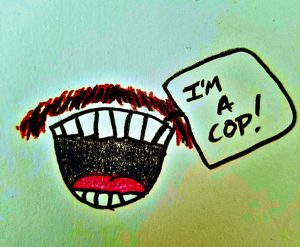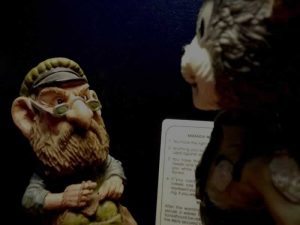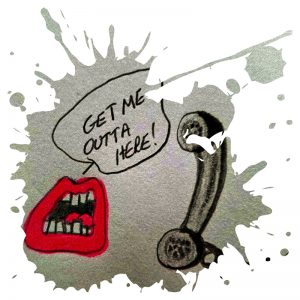As Seen On TV: Lies
Yes, TV sometimes often gets it wrong.
Therefore, I urge you to seek factual research sources. I also urge you to watch out for subliminal messaging on blogs. Yes, it’s a thing. Some bloggers insert hidden links, and images, that are designed to stimulate your senses, such as book covers and links to places to buy them. Of course, I’d never
do anything like that, but I’m always watching for those who do. Other tricks include a subtle posting of a popular event. These tactics often use catchy photos and super deals to attract your attention. Sometimes those deals are so over the top amazing that …

By the way, we now have a few new openings for the 2017 Writers’ Police Academy. And, we have a FANTASTIC deal for you!! Believe it or not, we’re making it possible for you to receive FREE registration to the WPA. Those of you who’ve already signed up … no problem. You could receive a refund. Details coming soon! And please don’t forget that Sisters in Crime (a major sponsor of the WPA) is offering a $150 discount to their members attending for the first time!
… we can’t seem to avoid clicking over to the site to sign up so we can join our friends at the most exciting event on the planet.
For now, though, let’s return to the topic du jour and take a look at my top ten list of fictional “facts” TV writers have gotten wrong for years.
10. Undercover officers must identify themselves if challenged by a criminal.

Not true. In fact, if this were indeed fact, well, there’d be no undercover operations. Every crook in the world would then simply ask the new guy, “Are you a cop?” The officer would then be forced to respond affirmatively and the deal would be over, and there’d be one less officer at the next Christmas party.
9. Officers must read a suspect his rights the moment he’s arrested.

No. Police officers are only required to advise bad guys of the Miranda warnings if they’re going to question them. That gobblety-gook about spouting off the warnings the second the officer slaps on the cuffs is just that—gobblety-gook.
8. The law says all criminals must be allowed to use the phone.

No. Most departments have a policy that allows the phone call, but there are no laws that require a phone call during the booking process. In jail, the use of the telephone is a privilege. In fact, the telephone is used as a tool for disciplinary action. You screw up, they take your phone privileges. End of story. The same is true with family visits and shopping at the jail commissary. Those privileges may also be taken away.
But the phone call the second a bad guy’s feet hit the booking area … nope. They’ll make the call when the extremely busy corrections officers have the time to help with the call. Typically, this is after the suspect is booked and placed in a cell. However, some agencies have phones in the booking area and will allow many arrestees to make a call asap. To do so often allows the person to post bail, thereby freeing up jail space. But it’s not an automatic thing/occurrence, nor is it a constitutional right to make a phone call whenever a prisoners decides to do so.
Some jails have phones inside the cell and dorm areas.

A very happy prisoner. I asked why the big smile. Her reply was, “Things could be worse. At least I’m alive and healthy.”
The silver-colored metallic cable you see on the right (to her left) is a telephone cord attached to a blue pay-type phone. This jail features a phone in each dorm. Inmates are allowed to make collect calls during approved times of the day only. The phones are switched off from the control booth during the “off” times.
7. You can be charged with obstruction of justice for not talking to the police.

No. You have the constitutional right not to incriminate yourself—the right to remain silent—because anything you say WILL be used against you. Say it during a police interview and I practically guarantee you will hear those words again in a courtroom.
However, there are laws that require you to answer basic questions, like, “What is your name?” and “Where do you live?” I guess I should mention that you’re also required, by law, to tell the truth when answering those questions.
6. Police officers have the authority to order someone to remain in town while they conduct their investigation.
Nope. Without a signed order from a judge police officers do not have the authority to enforce this demand. They can ask, but they can’t make you.
5. Officers have the authority to make deals with criminal suspects, such as how much prison time they’ll receive if they cooperate.
No. Only a prosecutor or judge has the authority to offer a deal to criminal suspects.
4. Officers have the authority to “drop” charges on a suspect once he’s been formally charged.
Again, no. Only a judge or prosecutor may have a defendant’s charges reduced or dismissed.
3. Officers can obtain a search warrant with simple phone call to a judge.
Not so fast TV Writers. A phone call won’t always result in receiving a search warrant. All search warrants must be signed by a judge or magistrate, which in many jurisdictions still requires a face-to-face meeting and a raising-your-right-hand-swearing-to-the-facts sort of thing. Even in the places where electronic transactions are permitted (and there are many these days), officers must have the paperwork in hand when they arrive to execute the search warrant.
2. Most criminal cases are solved by the use of forensic science, such as DNA and fingerprints.
No. Most crimes are solved the old fashioned way, by knocking on doors and talking to people. DNA and fingerprints are rarely the smoking gun in criminal cases.
1. Police officers leave the scene of the crime with lights and sirens going full blast.
No. Officers use lights and sirens when heading TO the scene of a crime, not when leaving. The use of emergency equipment is only permitted during an actual emergency. Once the bad guy is safely cuffed and stuffed in the rear of the patrol car the emergency is over and the lights go off. However, if the suspect is injured and requires medical care, officers sometimes transport them to the hospital. They’ll use lights and siren in those instances.
position: absolute; opacity: 1; z-index: 8675309; display: none; cursor: pointer; top: 2787px; left: 20px;”>Save







Lee, you left out one of your favorite peeves, that of the officer handing over or losing his/her weapon when confronting a criminal as demonstrated by Kate Beckett of “Castle.”
Thank you so much for posting this sort of information. In the excitement of telling a story, you sometimes forget the little things. And it’s the little things that will sometimes turn readers off.
Patience, my good peeps! 🙂
Details coming soon… anticipation is killing me!
So how do we get free registration for WPA?
TV and film writers have the luxury of having their audience see action unfold on the screen in real time. Writers of books aren’t as fortunate. Instead, they have the daunting task of selecting and arranging words in such a fashion that also allows their audience to “see” the story.
I mentioned these points because they are the kinds of details needed to help bring life to a not-so-detailed, or incorrectly-detailed cop story.
You sometimes don’t notice the illogical on television. I had never thought about the contradiction of turning the emergency lights, etc on when leaving a crime scene. But it is convenient that television has a breaking news bulletin that the cop catches to alert him to the next piece of the puzzle.
Great help, Lee. Of course, it’s still a problem when writers get it right but everyone thinks they’re wrong because these “myths” have been so prevalent in books, tv, and the movies. I try to run any police procedures by a real cop before I write it. And I love when I can have a non-LEO on scene to ask why the cop doesn’t do such-and-so, and he can explain that real life isn’t television, so maybe I’m educating a reader or two.
tudza – No. As I said, most crimes are not solved with the use of fingerprints and DNA. But if that evidence is available (it’s just not always there) then it’s very helpful and does help locate the suspect(s).
Good police work is what leads law enforcement officials to a suspect, and good police work is what helps put that offender in jail. Forensic evidence is merely icing on the cake. However, a single piece of forensic evidence can also make or break a case. There are just too many elements involved in a criminal case to single out ne as the thing that lands a bad guy in prison.
A good list.
With regard to #2, I can understand that forensics may not help you find your guy, but how important are they once things get to court? Not being of the CSI generation, I always had the impression that good police work caught the criminal and good forensic evidence made sure he went to jail.
Tangental to this are the local myths – the state I live in the legislature has developed laws protecting doctors from most civil suits. Over time this has turned into a pervasive belief that all doctors are protected from all laws. Including criminal and federal laws and regulations.
I have noticed on TV there is a tendency to mix local civil laws and criminal laws, and Federal laws and regulations as if they are all one.
SZ – Sure, there’s a dialog between the officers and the prosecutor. We often let the prosecutor know when a suspect has been particularly “helpful,” or not.
That sort of disclaimer would make me pass over that particular book and choose another. I know I’m only one sale lost, but a sale is a sale.
Don’t get me wrong, fiction is fiction. Those tales aren’t real, thank goodness. I love stories like the ones written by Dean Koontz, Stephen King, and others. Of course, I know their books aren’t realistic. But you can bet that the majority of the “real” stuff they write about is pretty darn accurate. For example, King wrote about an old Buick that had magical abilities. We know that’s not real, but SK went to the trouble of riding with Pennsylvania State Troopers (that’s where the story was set) for a while so he could get their procedures down pat, and it showed in his book. That’s how to do it!
What a great post ! You always make learning fun and easy. You should have had a six pack of kids Lee.
Can an officer “suggest” to a prosecutor to reduce a charge after cooperation ?
There is a successful author I have been reading who did a reprint of his first book and he stated some of the things he is writing is not police procedure and that he wrote it that way draw his audience in.